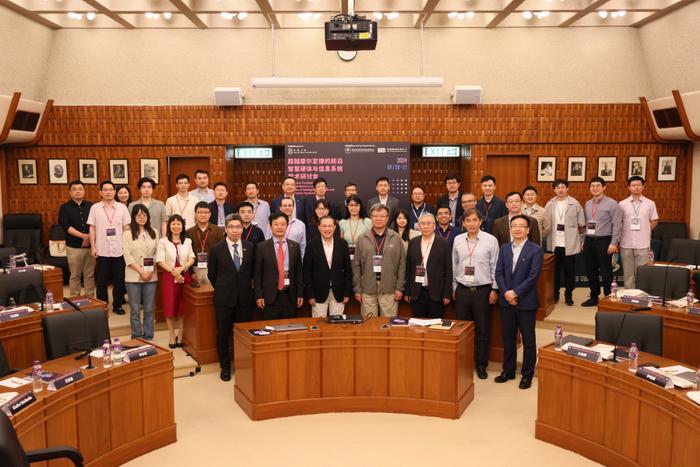Organised by HKU and sponsored by the National Natural Science Foundation of China (NSFC) and the Beijing-Hong Kong Academic Exchange Center, the symposium invited academicians from the Chinese Academy of Engineering – Gao Wen, Ding Wenhua, Fang Binxing, Zhang Ping and Gu Min, as well as Yu Dapeng, an academician from the Chinese Academy of Sciences, and nearly 40 experts and scholars from mainland China and Hong Kong as speakers.

Credit: The University of Hong Kong
Organised by HKU and sponsored by the National Natural Science Foundation of China (NSFC) and the Beijing-Hong Kong Academic Exchange Center, the symposium invited academicians from the Chinese Academy of Engineering – Gao Wen, Ding Wenhua, Fang Binxing, Zhang Ping and Gu Min, as well as Yu Dapeng, an academician from the Chinese Academy of Sciences, and nearly 40 experts and scholars from mainland China and Hong Kong as speakers.
Professor Max Shen, Vice-President and Pro-Vice-Chancellor (Research) of HKU; Professor Yongtao Zhang, Director General, Hong Kong, Macao and Taiwan Affairs Office, The National Natural Science Foundation of China; and Mr Hsu Hoi-shan, President of the Beijing-Hong Kong Academic Exchange Centre, attended the opening ceremony.
In his speech, Professor Max Shen stated that HKU placed high value on the conference, aiming to accelerate in-depth exchanges between experts from mainland China and Hong Kong. He said: “In the future, HKU will continue to invest resources, build a comprehensive talent team, shape a multidisciplinary research system, and work diligently to respond to the continuously changing information world, contributing HKU people’s wisdom and strength.”
Professor Yongtao Zhang stated: “In recent years, China has implemented an innovation-driven development strategy and strengthened its scientific and technological forces. Technologies such as artificial intelligence and big data have been widely applied, and innovative achievements continue to emerge. Hong Kong’s technology sector has long been making significant contributions to the development of both the city and the state. It is hoped that this forum can integrate the cutting-edge scientific and technological advancements in the information field with the country’s strategic needs, identifying and addressing the key scientific issues that urgently require attention and resolution for future development.”
Mr Hsu Hoi-shan said in his speech, “Today, Moore’s Law has approached the limits of physics, but photon computing and quantum computing have already been theoretically verified, much like the situation with transistors in the past. Now, scientists need to surpass the physical limitations of Moore’s Law, but we can continue to inherit the confidence behind it and regard our research work as the driving force for another golden era of chip technology.”
The symposium also delved into the current status and future trends of the frontier areas of information science and engineering, as well as China’s planning and strategy in information science basic research, technological innovation, industrial application promotion, and information science education. It provided important references and strategic guidance for relevant state departments to formulate industry planning and development plans.
For media enquiries, please contact:
Communication and Public Affairs Office, HKU
Ms Melanie Wan (Tel: 2859 2600 / Email: melwkwan@hku.hk)
Ms Jaymee Ng (Tel: 3910 3612 / Email: ngjaymee@hku.hk)
Mr Kenneth Choi (Tel: 3917 2607 / Email: khkchoi@hku.hk)



